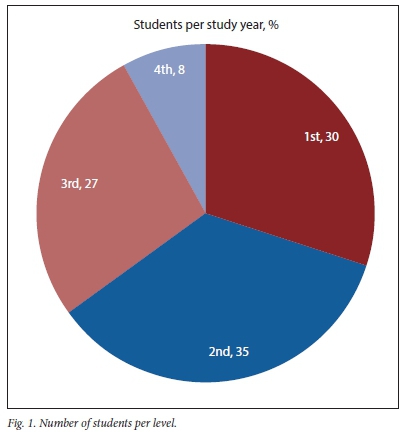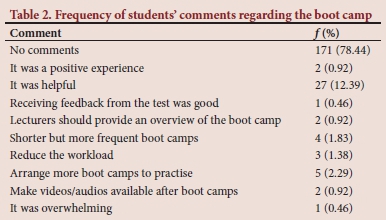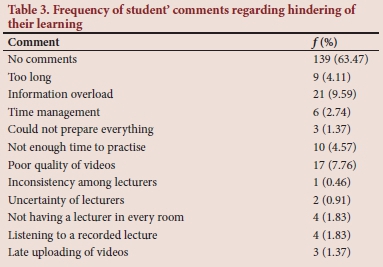Services on Demand
Article
Indicators
Related links
-
 Cited by Google
Cited by Google -
 Similars in Google
Similars in Google
Share
African Journal of Health Professions Education
On-line version ISSN 2078-5127
Afr. J. Health Prof. Educ. (Online) vol.14 n.1 Pretoria Mar. 2022
http://dx.doi.org/10.7196/AJHPE.2022.v14i1.1497
RESEARCH
An innovative educational strategy for learning and teaching clinical skills during the COVID-19 pandemic
C N Nyoni; A E Fichardt; Y Botma
PhD; School of Nursing, Faculty of Health Sciences, University of the Free State, Bloemfontein, South Africa
ABSTRACT
BACKGROUND: Educational institutions were compelled to adapt their educational strategies during the COVID-19 pandemic. The innovation of boot camps as a strategy for learning and teaching clinical skills was applied by a school of nursing immediately after the hard lockdown in South Africa
OBJECTIVES: To describe the outcomes of implementing an innovative educational strategy for the learning and teaching of clinical skills in an undergraduate nursing programme
METHODS: The study comprised a parallel convergent mixed-methods design. Qualitative data were collected from educators (n=7) involved with the boot camps, while the quantitative data comprised module evaluations by 219 students and summative practical assessment scores. Thematic analysis through an inductive approach was applied for the qualitative data, while central tendency and frequencies were used to analyse the quantitative data
RESULTS: Three themes emerged from the narrative data, i.e. rationalising the boot camps, executing the boot camps and learning from the boot camps. Quantitative data support each of the themes. The boot camps appeared to have been appreciated as an emergency innovative educational strategy, with improved student assessment outcomes
CONCLUSIONS: The COVID-19 pandemic forced education institutions to adopt a variety of innovative educational strategies. Boot camps appear to have positively influenced the learning and teaching of clinical skills at a school of nursing. There is a need for robust longitudinal research evaluating the long-term effect of such innovative educational strategies
Physical distancing and heightened infection prevention and control mechanisms compromised the possibility of learning and teaching clinical skills during the COVID-19 pandemic.[1] The synchronous interaction of educators and students in specific environments, such as simulation laboratories or hospitals, seemed to be impossible, and emergency remote teaching strategies did not adequately support the learning and teaching of clinical skills. Furthermore, remote locations, such as homes, were not ideal for the learning and teaching of clinical skills.[2] Health professions education institutions had to adopt innovative educational strategies for the learning and teaching of clinical skills during the COVID-19 pandemic.
The School of Nursing at the University of the Free State (UFS) houses one of the largest undergraduate degree nursing programmes in South Africa (SA). The programme's educators adhere to high standards of nursing education, including intensive clinical skills training. Students ordinarily spend an equal amount of time in the simulation laboratory and in the workplace to learn clinical skills. Educators typically teach clinical skills in the simulation laboratory weekly, and preceptors supervise these skills at the various clinical placement sites.[3] The objective structured clinical examination (OSCE) is the summative assessment method for clinical skills, moderated and pitched at the same difficulty index for each year group. The COVID-19 pandemic challenged the School of Nursing leadership to adopt innovative educational strategies. This article reports on the outcomes of implementing an innovative educational strategy on the learning and teaching of clinical skills by exploring educator and student experiences, which could provide insights into ways to adapt learning and teaching in response to crises.
The innovative education strategy: Clinical skills boot camps
Underpinned by the theory of deliberate practice,[4] the School of Nursing adopted boot camps after the hard lockdown as an innovative educational strategy to enhance the learning and teaching of clinical skills during the COVID-19 pandemic. Deliberate practice is understood as a type of purposeful and systematic learning of skills requiring focused attention, and is conducted to improve performance.[5] Boot camps are synonymous with conventional training camps, such as those in the military, where specific skills are learnt, and the School of Nursing adopted the practice for their particular situation.[6] At the School of Nursing, the boot camps had the dual aim of developing foundational clinical skills for undergraduate nursing students, including sessions missed during the higher levels of lockdown, and preparing the students for the 'new' workplace environment.
Each student year group was allocated a week at the simulation laboratory. Each year group was then split into smaller groups to attend their boot camp on specific days of the week. The module outcomes determined the nature and number of clinical skills to be taught per boot camp. All the students received a video recording of the clinical skills prior to the boot camp to prepare for the session. On the day of the boot camp, the group of students was further split into smaller manageable groups, which were stationed in smaller venues of the simulation laboratory with a preceptor. Equipment and materials related to the clinical skills for the day were made available in all the venues. A central venue hosted the leading session facilitator, who provided foundational information about the relevant clinical skill before a demonstration, while being live streamed to the other smaller venues. Students in smaller venues watched the leading facilitator via live streaming, after which they had opportunities for clarification from their preceptor. All the students in the small groups then demonstrated the taught skills to the preceptor, who immediately provided feedback. This intervention commenced after the hard lockdown and continued during 2020.
Purpose of the study
The purpose of this study was to describe the outcome of implementing boot camps on the learning and teaching of clinical skills by describing:
• the experiences of students regarding the learning of clinical skills through boot camps during the COVID-19 pandemic
• the experiences of educators regarding the teaching of clinical skills through boot camps during the COVID-19 pandemic
• the influence of boot camps on students' clinical summative assessment outcomes.
Methods
Research design
This study was executed through a parallel convergent mixed-methods research design.[7]
Population and sampling
Seventeen nurse educators from all levels of the undergraduate nursing programme who were directly involved with the boot camps, as well as 234 nursing students, comprised the study population. Census sampling was used to include all study participants. The assessment outcomes from the summative OSCEs for 2019 and 2020 for all the year groups were also included in this study.
Data collection
Two parallel methods aligned with the mixed-methods research design were used to collect data. Qualitative data were collected through in-depth interviews during January and February 2021. Data were collected from 7 participants by means of a virtual platform at a mutually convenient time. The virtual platform limited physical contact and reduced the likelihood of transmitting the coronavirus. After introductions and words of welcome, participants were asked to describe their experiences of the boot camps regarding the teaching of clinical skills during the COVID-19 pandemic. Being an experienced qualitative researcher, the interviewer used validation, open-ended questions and probing. Each interview was recorded with the participant's permission and electronically transcribed. Quantitative data were collected from student module evaluations and their summative OSCE scores. Students were informed about the research and that they were consenting by completing the module evaluation. The module evaluation form was tailor made to reflect each student's experiences of the boot camps. Students completed a module evaluation form anonymously at the end-of-the-year summative OSCE. Final OSCE marks at the middle of the year and at the end of the year per year group for 2019 and 2020 were accessed, coded and collated.
Data analysis
The data were analysed to address each of the objectives of this study. Thematic analysis was used to analyse the qualitative data.[8] Initially, the data were transcribed verbatim and uploaded to ATLAS.ti software (ATLAS.ti, Germany) for qualitative data analysis. Study participants reviewed their transcripts for confirmation and correction. The subsequent step involved applying various coding methods, such as initial, axial, in vivo, open, descriptive and structural coding. The final step applied pattern coding in grouping the outcomes of the second step into themes. A biostatistician analysed the quantitative data by describing the measures of central tendency and comparing the mean assessment scores between the performances in 2019 and 2020.
Ethical approval
This study was approved by the Health Sciences Research Ethics Committee (HSREC) of the University of the Free State (ref. no. UFS-HSD 2020/2064/2601). The head of the School of Nursing granted permission to access assessment-related data. All participants included in the study consented in writing to participate. Ethical considerations, such as voluntary participation, informed consent, privacy and confidentiality, were considered throughout the study.
Results
Seven nurse educators and 219 undergraduate nursing students participated in the study. Fig. 1 shows the breakdown of the number of students who responded per level.

The three overarching themes from the qualitative analysis are integrated with the quantitative findings.
Theme 1: Rationalising the boot camps
The educators in this study acknowledged the dire consequences of the COVID-19 pandemic on clinical skills teaching. The COVID-19-related lockdown meant that students could not learn clinical skills at home, and without an intervention such as the boot camps, there was no foreseeable approach of teaching clinical skills to the nursing students (please note that all direct quotations are reproduced verbatim and unedited):
'Honestly, I still look back then and wonder what else could have been done - there was no other way than this approach to teach[ing] those skills ... students would have been left behind and possibly not even graduate.' (Participant 6)
Educators perceived the unstable and risky clinical environment at the time as not conducive to clinical skills teaching. Students were not allowed in the COVID-19 wards, and some of the facilitators were also high-risk candidates for COVID-19. Consequently, 199 (92.9%) of the students agreed that boot camps enhanced their learning of clinical skills (Table 1).
Theme 2: Executing the boot camps
The participants identified variations in the execution of the boot camps, depending on the level of the students, the number of students, and the number of skills to be taught. Despite a prescribed approach for the boot camps, each level adopted a strategy suitable for them:
'It is essential to understand that one size does not fit all; there should be consideration of the number of students and number of skills to facilitate. We applied the strategy as we saw fit for our level.' (Participant 1)
The educators felt that the students had issues during the boot camps. According to the educators, the students did not prepare sufficiently for the sessions, seemed tired and also overwhelmed by the number of clinical skills during a boot camp session. Approximately 60% of the students found the workload during the camps manageable, but 9 (4.11%) students found the camps too long, while 21 (9.59%) students reported information overload (Table 2):

'The poor students, we were expecting a lot from them. Can you imagine learning 11 clinical procedures in one day? We posted the videos for these procedures, but really do you think they would prepare - for 11 procedures?' (Participant 6)
The process of executing the boot camps was enabled by the facilities within the School of Nursing, the teamwork among the educators and the support from the institutional leadership. However, the educators expressed exhaustion owing to the repetitive nature of the boot camps and the time-intensiveness, while 21 (9.59%) of the students reported information overload (Table 3):

'I do not want to be in any boot camp again, I have never felt this tired. But my colleagues were good; they supported me and the facilities at the lab made the situation even better.' (Participant 7)
Theme 3: Learning from the boot camps
The educators learnt from the boot camp experience through the reflection on their practice, which enabled them to improve their practice and teaching of clinical skills:
'We were able to re-think the strategy as we implemented it. It got better, I think, in the second semester although there were many skills to be taught.' (Participant 3)
The quantitative data provided evidence of learning among students. There was an overwhelmingly positive response from the students to the boot camps (Table 1). The students' 2020 marks in all 4 OSCEs were significantly higher than those of the previous year (Table 4).
Discussion
This study describes the outcomes of implementing boot camps as an innovative educational strategy for the learning and teaching of clinical skills in an undergraduate nursing programme. The results present the perceived reasons for the boot camps, the process of enacting the boot camps, and the outcomes of the boot camps. These camps appeared to have influenced the learning and teaching of clinical skills during the COVID-19 pandemic positively. However, the strategy was appreciated as an emergency solution in response to COVID-19 and is not regarded as suitable for longterm educational purposes.
Various factors seemed to have enabled the boot camps, i.e. the infrastructure, the educators and the leadership within the institution. Caliskan and Zhu[9] argue for organisational culture and milieu as integral in supporting the adoption of educational innovations. The organisational culture may include the agency, the people, the resources and the mechanisms that support the synergistic interaction of these variables.[10] The adoption of an educational strategy, such as boot camps, may not result in similar outcomes as reported in this article owing to the unique nature of the institution in question. However, a similar strategy, underpinned by deliberate practice based on institutional realities and organisational culture, may yield improved educational outcomes.
The outcomes of the implementation of the boot camps as an educational intervention aligned with the first two levels of the Kirkpatrick evaluation model (level 1 and level 2).[11] Students and educators alike appeared to value the boot camps. They reflected that it was worth their time and effort, even though some consequences seemed negative, such as tiredness and the general concern of overload. The quantitative strand of the study also reflected learning with improved assessment outcomes. These positive outcomes aligned with the key tenets of deliberate practice, where practising more intensively and intently contributed to learning and mastery of skills.[12] The literature supports the need for educational interventions to meet the highest levels of the Kirkpatrick evaluation model (level 3 and level 4),[13] which were beyond the scope of this study. More robust longitudinal research approaches should be instituted that would evaluate the impact of innovative educational strategies adopted in crisis situations on student competence in the clinical environment.
Conclusions
Disruption to health professions education institutions creates a need for innovative educational strategies aimed at continued learning. The boot camps, implemented during the COVID-19 pandemic, resulted in positive outcomes for the learning and teaching of clinical skills. However, the adoption of such an educational strategy to other settings hinges upon several factors, including organisational culture and infrastructure availability. Future research in this setting could evaluate the clinical competence of students.
Declaration. None.
Acknowledgements. Mr Cornel van Rooyen is acknowledged for the quantitative data analysis, and Dr Ruth Albertyn for her critical insight into the manuscript. Ms Jackie Viljoen is acknowledged for language editing of the article.
Author contributions. All authors contributed to the conception, design, and execution of this study.
Funding. None.
Conflicts of interest. None.
References
1. Al-Balas M, Al-Balas HI, Jaber HM, et al. Distance learning in clinical medical education amid COVID-19 pandemic in Jordan: Current situation, challenges, and perspectives. BMC Med Educ 2020;20:341. https://doi.org/10.1186/s12909-020-02257-4 [ Links ]
2. Puljak L, Civljak M, Haramina A, et al. Attitudes and concerns of undergraduate university health sciences students in Croatia regarding complete switch to e-learning during COVID-19 pandemic: A survey. BMC Med Educ 2020;20:416. https://doi.org/10.1186/s12909-020-02343-7 [ Links ]
3. Botma Y. Nursing students' perceptions on how immersive simulation promotes theory-practice integration. Int J Africa Nurs Sci 2014;1:1-5. https://doi.org/10.1016/jjjans.2014.04.001 [ Links ]
4. Gonzalez L, Kardong-Edgren S. Deliberate practice for mastery learning in nursing. Clin Sim Nurs 2017;13(1):10-14. https://doi.org/10.1016/j.ecns.2016.10.005 [ Links ]
5. Wang JM, Zorek JA. Deliberate practice as a theoretical framework for interprofessional experiential education. Front Pharmacol 7 July 2016. https://doi.org/10.3389/fphar.2016.00188 [ Links ]
6. Janice P, McLaughlin D, Hankamer B. A simulation boot camp for future nurse educators. Nurse Educ 2021;46(3):134-135. https://doi.org/10.1097/NNE.0000000000000894 [ Links ]
7. Polit DF, Beck CT. Essentials of Nursing Research: Appraising Evidence for Nursing Practice. Philadelphia: Lippincott Williams & Wilkins, 2010. [ Links ]
8. Saldana J. The Coding Manual for Qualitative Researchers. 3rd ed. Thousand Oaks: SAGE, 2016. [ Links ]
9. Caliskan A, Zhu C. Organisational culture and educational innovations in Turkish higher education: Perceptions and reactions of students. Educ Sci Theory Pract 2020;20(1):20-39. https://doi.org/10.12738/jestp.2020.L003 [ Links ]
10. Kolster R. Structural ambidexterity in higher education: Excellence education as a testing ground for educational innovations. Eur J High Educ 2020;11(2):1-18. https://doi.org/10.1080/21568235.2020.1850312 [ Links ]
11. Gamtessa LC, Tiyare FT, Kebede KM. Evaluation of helping babies breathe and essential care for every baby training in southern nation's nationalities and people's region, Ethiopia: Applying a Kirkpatrick training evaluation model. BMC Res Notes 2020;13(1):567. [ Links ]
12. Hambrick DZ, Oswald FL, Altmann EM, Meinz EJ, Gobet F, Campitelli G. Deliberate practice: Is that all it takes to become an expert? Intelligence 2014;45(1):34-45. https://doi.org/10.1016/j.intell.2013.04.001 [ Links ]
13. Cahapay M. Kirkpatrick model: Its limitations as used in higher education evaluation. Int J Assess Tools Educ 2021;8(1):135-144. https://doi.org/10.21449/ijate.856143Publishedathttps://ijate.net/https://dergipark.org.tr/en/pub/ijate [ Links ]
 Correspondence:
Correspondence:
C N Nyoni
nyonic@ufs.ac.za
Accepted 10 May 2021














